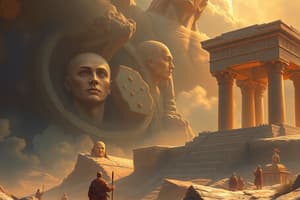Podcast
Questions and Answers
What is history?
What is history?
History is the systematic study and documentation of the human past, including the memory, discovery, collection, organization, presentation, and interpretation of past events.
What is considered prehistory?
What is considered prehistory?
The period of events before the invention of writing systems is considered prehistory.
What sources do historians use to seek knowledge of the past?
What sources do historians use to seek knowledge of the past?
Historians seek knowledge of the past using historical sources such as written documents, oral accounts, art and material artifacts, and ecological markers.
What is the nature of history as an academic discipline?
What is the nature of history as an academic discipline?
What do historians debate regarding the nature of history?
What do historians debate regarding the nature of history?
When was the League of Nations founded?
When was the League of Nations founded?
When did the main organization of the League of Nations cease operations?
When did the main organization of the League of Nations cease operations?
What were the primary goals of the League of Nations as stated in its Covenant?
What were the primary goals of the League of Nations as stated in its Covenant?
What event led to the founding of the League of Nations?
What event led to the founding of the League of Nations?
What was the significance of the League of Nations in shaping the modern world?
What was the significance of the League of Nations in shaping the modern world?
Flashcards are hidden until you start studying
Study Notes
History
- The study of history is the systematic investigation and documentation of human past events.
- The period before the invention of writing systems is considered prehistory.
- History is an umbrella term encompassing past events, memory, discovery, collection, organization, presentation, and interpretation.
- Historians use various sources, including written documents, oral accounts, art, material artifacts, and ecological markers, to acquire knowledge of the past.
- History is incomplete and has debatable mysteries.
- History is an academic discipline that uses narrative to describe, examine, question, and analyze past events, investigating patterns of cause and effect.
The League of Nations
- The League of Nations was the first worldwide intergovernmental organization, established on 10 January 1920 by the Paris Peace Conference.
- The organization's primary mission was to maintain world peace after World War I.
- The League ceased operations on 20 April 1946, and its components were relocated into the United Nations.
- The League profoundly shaped the modern world, serving as a template for modern global governance.
- The League's primary goals, as stated in its Covenant, included:
- Preventing wars through collective security and disarmament
- Settling international disputes through negotiation and arbitration
- Improving labour conditions
- Ensuring just treatment of native inhabitants
- Combating human and drug trafficking
- Regulating the arms trade
- Promoting global health
- Protecting prisoners of war
- Safeguarding minorities in Europe
- The Covenant of the League of Nations was signed on 28 June 1919 as Part I of the Treaty of Versailles.
Studying That Suits You
Use AI to generate personalized quizzes and flashcards to suit your learning preferences.




